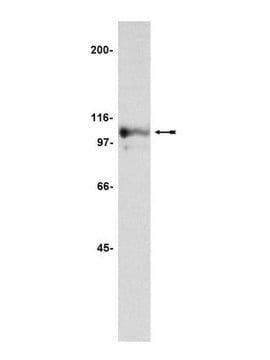MAB4444
Anti-Epithelial Cell Adhesion Molecule (EpCAM) Antibody, clone 8
clone mab 8, from mouse
Synonyme(s) :
Adenocarcinoma-associated antigen, CD326 antigen, Cell surface glycoprotein Trop-1, Epithelial cell surface antigen, Epithelial glycoprotein, KS 1/4 antigen, Major gastrointestinal tumor-associated protein GA733-2, antigen identified by monoclonal antibo
About This Item
Produits recommandés
Source biologique
mouse
Niveau de qualité
Forme d'anticorps
purified immunoglobulin
Clone
mab 8, monoclonal
Espèces réactives
human
Technique(s)
flow cytometry: suitable
immunocytochemistry: suitable
western blot: suitable
Isotype
IgG2aκ
Numéro d'accès NCBI
Numéro d'accès UniProt
Conditions d'expédition
wet ice
Modification post-traductionnelle de la cible
unmodified
Description générale
Spécificité
Immunogène
Application
Western Blot Analysis: A previous lot was used by an independent laboratory in WB. (Ng, V., et al., 2010)
Stem Cell Research
Pluripotent & Early Differentiation
Adhesion (CAMs)
Qualité
Immunocytochemistry Analysis: 1-10 µg/mL from a previous lot detected epithelial cell adhesion molecule (EpCAM) in human embryonic stem cells.
Description de la cible
Forme physique
Stockage et stabilité
Remarque sur l'analyse
Human embryonic stem cells
Autres remarques
Clause de non-responsabilité
En option
Code de la classe de stockage
12 - Non Combustible Liquids
Classe de danger pour l'eau (WGK)
WGK 1
Point d'éclair (°F)
Not applicable
Point d'éclair (°C)
Not applicable
Certificats d'analyse (COA)
Recherchez un Certificats d'analyse (COA) en saisissant le numéro de lot du produit. Les numéros de lot figurent sur l'étiquette du produit après les mots "Lot" ou "Batch".
Déjà en possession de ce produit ?
Retrouvez la documentation relative aux produits que vous avez récemment achetés dans la Bibliothèque de documents.
Notre équipe de scientifiques dispose d'une expérience dans tous les secteurs de la recherche, notamment en sciences de la vie, science des matériaux, synthèse chimique, chromatographie, analyse et dans de nombreux autres domaines..
Contacter notre Service technique







